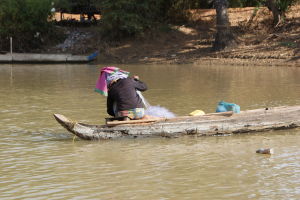Evictions in Beoung Kak: At What Cost?
 In the past week, seven women who were peacefully protesting against government-backed flooding of their homes were arrested by authorities outside of the Phnom Penh city hall. Citing charges of obstructing traffic law, the women were subsequently tried and sentenced to a year behind bars. Since then, further protests have demanded for the release of the women, during which an additional four peaceful protestors have been apprehended and received the same sentence by the Municipal Court. Their fine was the Cambodian-Riel equivalent of $500 U.S. dollars - a burdensome fee for anyone in a country with an average income of $750 per year.
In the past week, seven women who were peacefully protesting against government-backed flooding of their homes were arrested by authorities outside of the Phnom Penh city hall. Citing charges of obstructing traffic law, the women were subsequently tried and sentenced to a year behind bars. Since then, further protests have demanded for the release of the women, during which an additional four peaceful protestors have been apprehended and received the same sentence by the Municipal Court. Their fine was the Cambodian-Riel equivalent of $500 U.S. dollars - a burdensome fee for anyone in a country with an average income of $750 per year.
The flooding of Beoung Kak lake began in 2006, when Prime Minister Hun Sen began to back corporations aiming to create a bustling commercial district in the area. At the heart of Cambodia’s capital, the lake’s vicinity is home to nine villages and some 4000 families. By filling in the lake, construction firms such as Sukaku Inc. and Erdos HongJun Investment Co., Ltd. have forcibly evicted more than 20,000 residents, leaving them with meager remediation (about $4,000 total) to begin lives anew.
As a country still recovering from Khmer Rouge, loss of intellectuals and extreme poverty, it is apparent that government is taking pained efforts to create a more vibrant capital. However, the Beoung Kak lake project does pose serious challenges. Filling the lakes would directly affect the country’s drainage system. Given the land laws already in place, government and corporate actions are also legally questionable. Humanitarian groups criticize the government for not adhering to the land laws, namely a 1996 law that decided “natural resources…should be conserved, developed, managed and used in a rational and sustainable manner.” The force flooding, taking place at an alarming rate, shows no signs of sustainable behavior. As the lake is state property, land laws dictate that it cannot be damaged or destroyed; by filling in the lake, damages to the lake are certain. Notwithstanding, leasing the lake to private companies, if long-term, is also a provisional violation.
Activists remind us that forced evictions are not new in Cambodia’s policy making. Millions were forced to empty their urban homes and resettle in the countryside under Pol Pot’s ideals of agrarian socialism. Today, Cambodians are witnessing the largest but much less publicized relocation project since 1975.
Currently the imprisoned protestors have been arrested for “obstructing public traffic”, in accordance to Article 78 of Cambodia’s traffic laws. However, evicted residents believe there is more to the authorities’ agenda of excessive force. The protestors have been brutally beaten and threatened by authorities for seeking UN intervention or simply requesting empathy from the policy makers. Humanitarian groups such as Inclusive Development International and Licadho have supported the people’s efforts for remediation. Their support includes informing protestors of their land rights, what has been unlawfully taken from them and should be taken back.
Meanwhile, the attitude towards the arrested protestors among countries have been far from sympathetic. South Korean firms have benefited from since 2006. In joint ventures with Cambodian companies, they have created a satellite city at the cost of filling in Lake Pong Peay. Erdos HongJun, a Chinese firm, works closely with Shukaku Inc. and is behind the Beoung Kak Lake project.
Regardless of growing voices against further damages to the lake and neighboring homes, the government has shown no signs of halting development projects. The prioritization of renewing the nation’s capital, from a cluster of slums to one that boasts skylines, attracts business and tourists, seems to be unwavering. But at what cost? This may not be on the government’s mind, but some are not optimistic about the projects. A quote from the Director of the Cambodian Center for Human Rights in 2008 could never be more relevant.“The problem is that this caters to a tiny powerful group.” Ou Virak lamented. “The Government is attempting to develop and modernize Cambodia quickly, but they’ve lost sight of the people they’re trying to help.”
